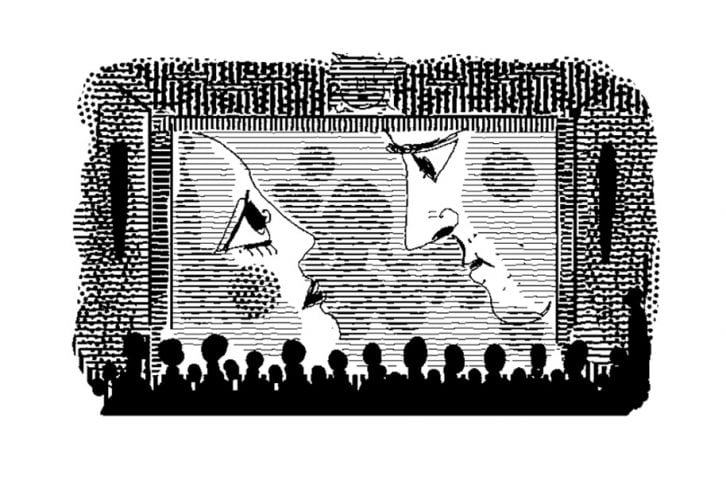Books Reviewed
A review of Shakespeare's Political Wisdom , by Timothy Burns
, by Timothy Burns
In Shakespeare's Political Wisdom Timothy Burns calls for a "naïve" reading of the Bard that doesn't interpret his plays through the lens of modern political theory or contemporary social science. Instead, Burns attempts to recover—and uncover—the classical political thought within five plays: Julius Caesar, Macbeth, The Merchant of Venice, King Lear, and The Tempest.
By reading Shakespeare as political philosophy, Burns's book recalls the innovative approach of Allan Bloom and Harry V. Jaffa in Shakesepare's Politics (1964), which looked at The Merchant of Venice,Othello, Julius Caesar, and King Lear. Like Bloom and Jaffa, Burns sets out to understand the plays as Shakespeare intended them to be read and digested, without modern or postmodern assumptions: "[p]rior to the emergence of modern political philosophy," political life was "a stage on which virtues and vices were made manifest" and Shakespeare "made human beings who lived that full political life the subject of many of his plays." Because classical forms had been rediscovered during the Renaissance, Burns assumes that Shakespeare would have read, absorbed, re-imagined, and dramatized classical political thought. Hence Burns, a professor of government at Skidmore College, is comfortable making frequent and specific references to Aristophanes, Plato, Aristotle, and Machiavelli, whether or not there's evidence that Shakespeare read them. We do at least know he not only read but also brilliantly reconceived Plutarch's Parallel Lives into the most significant political plays of the Elizabethan age.
Shakespeare's political wisdom is thus not simply and directly his own, but an assimilation of ancient Greek and Roman thought. During the Renaissance, poetry had a public purpose: to dramatize human excellence and weakness; and the poet was often seen as a more effective educator than the historian or the philosopher. Sir Philip Sidney's An Apology for Poetry (c. 1595), for example, defined the "right poet" as a quasi-Socratic able "to move men to take that goodness in hand, which without delight they would fly from as from a stranger; and…to make them know that goodness whereunto they are moved."
Burns's close readings of Shakespeare—act by act, scene by scene, speech by speech—are certainly not naïve in any normal sense of the word. Shakespeare's characters are presented as political actors making ethical choices and judgments within scenarios that are charged with political, moral, and personal crises. In the book's first, and strongest, chapter, "The Problem of Classical Republicanism," Burns reads Julius Caesar in light of Book 3 of Aristotle's Politics, considering the difference and tension between monarchical and republican constitutions and, above all, whether devotion to a godlike ruler elevates or degrades justice and the personal and public pursuit of virtue. Though no literary critic would label Caesar Shakespeare's "masterpiece," as Burns does, his subtle and masterly analysis of Caesarism's bloody cradle showcases the play as its creator's most sustained and complex critique of classical political philosophy.
* * *
Throughout the play, the tension between pre-eminence and egalitarianism as standards of political virtue is embodied in the opposed political principles of devotion to Caesar and devotion to the republic. Even the play's brief opening scene is an overture to such irresolvable conflicts. The people's tribunes actually oppose the will of the people, and their own arguments rehearse both political positions: Marullus condemns the people's support for Caesar as a betrayal of their earlier devotion to Pompey, while Flavius excoriates devotion to Caesar as a threat to the legal and civic equality that makes possible every Roman's cultivation of virtue. Burns's commentary on the rest of the play points to other significant contradictions and conflicts between and within characters and their principles—such as Brutus's selfless devotion to Rome and his pride in his own virtue—as republican principles devolve into murder and suicide.
The remaining essays are less coherent and elide into more casual, though still illuminating, commentaries on their texts. The interpretations of Macbeth and Lear, in particular, would be familiar to anyone who has spent much time with these plays, and too much space in the four later essays is taken up with plot details and actions. Although the Caesar commentary engages with other political interpreters of Shakespeare's play (e.g., Bloom, Jan Blits, and Robert Miola), Burns's other readings do not (the chapter on The Tempest has no secondary references at all). Shakespeare's Political Wisdom seems to have grown out of a course by the same title that Professor Burns teaches, and the later chapters, at their weakest, read like classroom lectures.
* * *
Surprisingly, Burns excludes Shakespeare's English history plays, despite their manifestly political content—conflicts over who should rule England, depositions, civil and international warfare. In his Introduction, he argues sweepingly that political life in these plays is distorted and diminished by Christian ethics, which would seem to be a good reason for examining them. Nevertheless, he claims that the English history plays point to the problem of divine justice, which he believes to be "the deepest question explored" in the five plays he does study.
For Timothy Burns, the heroes and heroines of his selected plays (Malcolm, Portia, Edgar, Prospero, and those of Julius Caesar) are either pre-Christian or non-Christian in their actions, and therefore regard providential or transcendent justice as a human fiction. Prospero is the most clear-sighted of these quasi-pagan figures, and his ultimate wisdom, according to Burns, discovers no difference between a stage play and the "insubstantial pageant" of the world that, like all of us, will ultimately "dissolve" and "leave not a rack behind." And yet Shakespeare endures.
* * *
For Correspondence on this review, click here.





